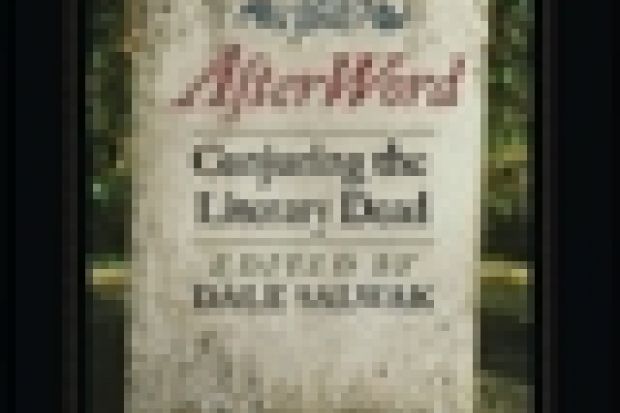The living talk a lot to the dead. Writers are no exception. "Dante and Virgil were continually pestering people who were damned to hell and wanted nothing more than to be left alone," says the fictional George Orwell in AfterWord, an eccentric collection of imagined interviews with dead authors. But as this book was compiled in a secular age, the contributors do not worry about the other-worldly location of the interviewees.
The collection has a rather po-faced introduction, followed by a reprint of a Margaret Atwood lecture given at the University of Cambridge in 2002 concerning the mythology of the dead - not especially relevant here. Then come the encounters, some delivered as hallucinations, others as imagined meetings, one using H.G. Wells' time machine to engineer the meeting of George Orwell, KGB agent Alexander Litvinenko, critic Lionel Trilling and Tony Blair. The chapters are written by critics, creative writers and biographers, all displaying the ruthlessness of their craft. All choose fairly recent authors about whom much is known; then, to inform the uninitiated, they must, curiously, inform their dead subjects about the lives they lived. Henry James appears in five of the 15 essays - quite properly, given his story about a biographer confronting the ghost of his subject.
The interview is the usual mode, although Ann Thwaite imagines an overheard conversation in a railway carriage beside Edmund Gosse and Frances Hodgson Burnett, sitting opposite Emily Tennyson and a young A.A. Milne. The interviewers are a pretty rude bunch; were they facing living authors, they would probably be shown the door or the boot. Persistently, they ask about hitherto hidden sex lives. Did Samuel Johnson consort with prostitutes? Did James sleep "carnally" with Oliver Wendell Holmes? Did Oscar Wilde's venereal disease prevent his having sex with his wife? Why was George Gissing so fatally attracted to unsuitable women?
Interviewers relish raising the hackles of their prey. Carl Rollyson marvels at his own effrontery with William Faulkner. Alan Sillitoe enjoys Joseph Conrad's anger: "You have my fullest admiration for having the courage to take such a liberty with my tolerance." No outburst follows, however, since interviewer and interviewee have drunk heavily, and Conrad becomes mellow as Sillitoe forgets to take notes. When Robert Frost insists, "I'm beyond old", Jay Parini counters, "You're dead", only to be told not to be too clever.
Indeed, the contributors are rather fond of congratulating themselves through their authors. Wilde calls Francis King both "sharp" and a "delicate flower"; Edith Wharton praises John Halperin for his "shrewd question" - rather a flattering response given such queries as "Do you have any comment on the exposition of criticism of your work in recent years?"
Some dead authors evade the questions by becoming grumpy or, in Wilde's case, by falling asleep and snoring. Others obligingly explicate their work. So Wharton thinks that Lily Bart in her novel The House of Mirth did kill herself, and Jane Austen tells us that Emma Woodhouse is the narrative principle of the book, the promoter of the plot. Sometimes the interviewer intrudes modern medical knowledge on to the suffering subject: in the case of Gissing, even offering modern treatment until the realisation strikes that, if it is accepted, the admired novels will not be written.
The least successful contributors try to imitate their authors' styles, and many of the chapters are arch or plodding. But there are a few gems. King's contribution on Wilde is a witty weaving of his own reminiscences with his subject's, so that both confront youthful versions of themselves, and Wilde, let loose from time, can be shadowed by the critic Kenneth Tynan who shares his indulgence in outrageous (prepared) witticisms and towering self-regard. King catches the sadness of the biographer who can never be the first to hear the memorable words.
Colin Dexter's delightful contribution on A.E. Housman breaks ranks with the sex-probers by declaring: "His sexuality is clearly of considerable interest to some. To me it is of no concern or interest whatsoever." He then obligingly answers the questions we moderns want to know: that Housman loved Moses Jackson, that he might have failed Classics at the University of Oxford because he entered the wrong index number on his examination sheet, and that perhaps he would not let Ludwig Wittgenstein use his personal toilet in Trinity College because he had made use of it himself and was "embarrassedly aware of the malodorous miasma that still lingered around that room".
AfterWord: Conjuring the Literary Dead
Edited by Dale Salwak
University of Iowa Press
248pp, £17.50
ISBN 9781587299896
Published 15 May 2011
